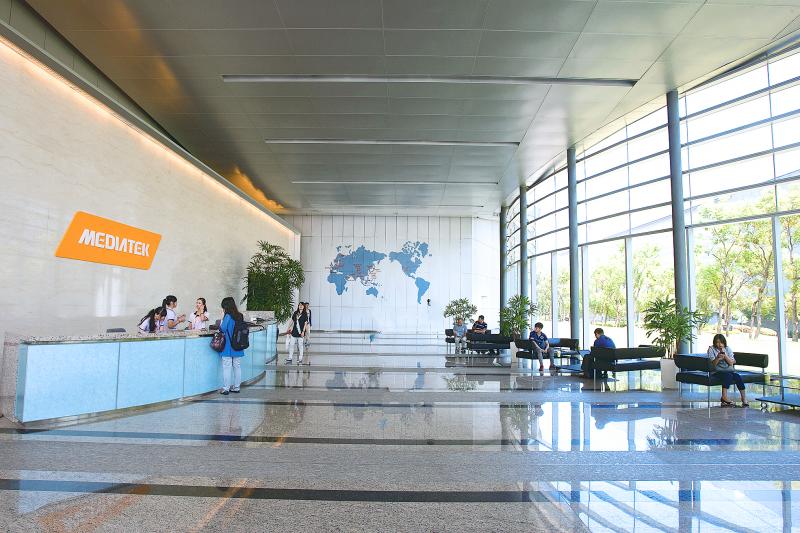MediaTek Inc (聯發科)aims to hire 2,000 workers by the end of this year to support its growth, tripling the number of positions it opened in the same period last year,the company said yesterday.
The world’s biggest designer of 5G smartphone chips had 17,377 employees as of the end of April.
“MediaTek seeks to widen its talent pool, as it is bullish about its business prospects,” the Hsinchu-based company said in a statement.

Photo courtesy of MediaTek Inc
It reported that revenue rose 82 percent in the first half of the year.
In July, it forecast that revenue for the whole of this year would increase 45 percent from last year amid improved uptake of 5G phones, while annual revenue would reach US$20 billion within two years, double last year’s figure.
To lure semiconductor talent, MediaTek said would offer annual salaries of NT$2 million (US$72,273) for new employees with bachelor’s degrees and NT$2.5 million for those with doctorates.
Based on statistics compiled by 104 Job Bank (104人力銀行), there are expected to be 28,000 job openings at local semiconductor firms this year, compared with 12,000 graduates with training in the semiconductor industry from Taiwanese institutions each year.
The job openings at MediaTek are mainly for chip developers at its premises in Taipei and Hsinchu.
The firm’s chips are used in smartphones, TVs, tablets, networking devices and Internet of Things devices.
The company this month arranged job fairs, as well as online and in-person interviews at 10 universities, including National Cheng Kung University, National Taiwan University and National Yang Ming Chiao Tung University.

SEASONAL WEAKNESS: The combined revenue of the top 10 foundries fell 5.4%, but rush orders and China’s subsidies partially offset slowing demand Taiwan Semiconductor Manufacturing Co (TSMC, 台積電) further solidified its dominance in the global wafer foundry business in the first quarter of this year, remaining far ahead of its closest rival, Samsung Electronics Co, TrendForce Corp (集邦科技) said yesterday. TSMC posted US$25.52 billion in sales in the January-to-March period, down 5 percent from the previous quarter, but its market share rose from 67.1 percent the previous quarter to 67.6 percent, TrendForce said in a report. While smartphone-related wafer shipments declined in the first quarter due to seasonal factors, solid demand for artificial intelligence (AI) and high-performance computing (HPC) devices and urgent TV-related orders

Taiwan Semiconductor Manufacturing Co (TSMC, 台積電) and the University of Tokyo (UTokyo) yesterday announced the launch of the TSMC-UTokyo Lab to promote advanced semiconductor research, education and talent development. The lab is TSMC’s first laboratory collaboration with a university outside Taiwan, the company said in a statement. The lab would leverage “the extensive knowledge, experience, and creativity” of both institutions, the company said. It is located in the Asano Section of UTokyo’s Hongo, Tokyo, campus and would be managed by UTokyo faculty, guided by directors from UTokyo and TSMC, the company said. TSMC began working with UTokyo in 2019, resulting in 21 research projects,

Quanta Computer Inc (廣達) chairman Barry Lam (林百里) yesterday expressed a downbeat view about the prospects of humanoid robots, given high manufacturing costs and a lack of target customers. Despite rising demand and high expectations for humanoid robots, high research-and-development costs and uncertain profitability remain major concerns, Lam told reporters following the company’s annual shareholders’ meeting in Taoyuan. “Since it seems a bit unworthy to use such high-cost robots to do household chores, I believe robots designed for specific purposes would be more valuable and present a better business opportunity,” Lam said Instead of investing in humanoid robots, Quanta has opted to invest

EXPANSION: While Gigabyte Technology is optimistic about market demand this year, uncertainty remains due to the impact of potential US tariffs and currency fluctuations Motherboard and graphics card maker Gigabyte Technology Co (技嘉) yesterday said that it plans to launch an artificial intelligence (AI) server assembly line in the US in the second half of this year. The company’s core motherboard and graphics card businesses in the US remain stable, but sales of its higher-priced AI servers still hinge on the development of tariff policies, Gigabyte chairman Dandy Yeh (葉培城) told reporters following the company’s annual shareholders’ meeting in Taipei. Yeh was referring to the “reciprocal” tariffs announced by US President Donald Trump on April 2, which were later postponed for 90 days. While Gigabyte